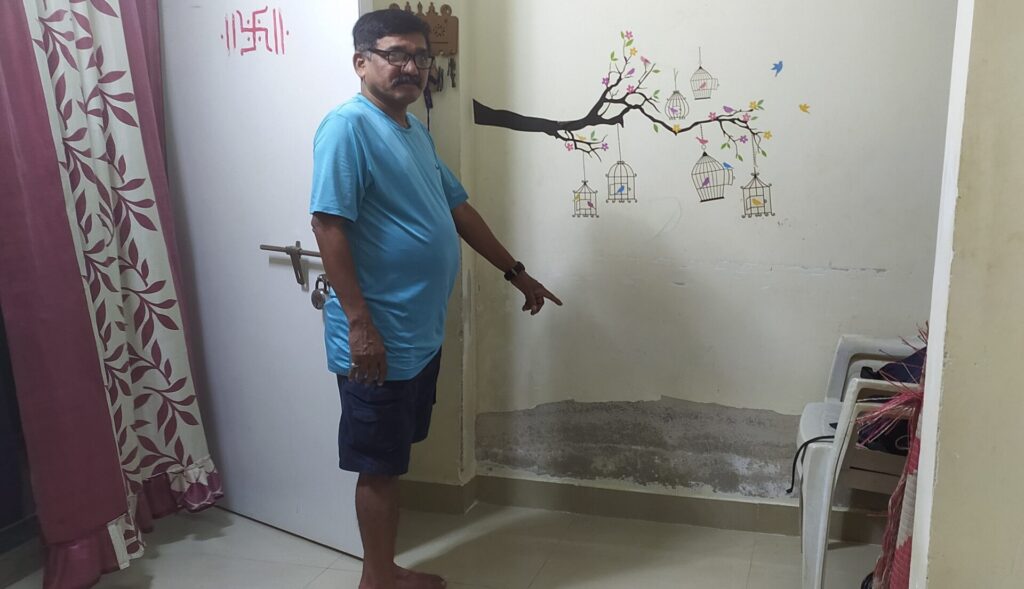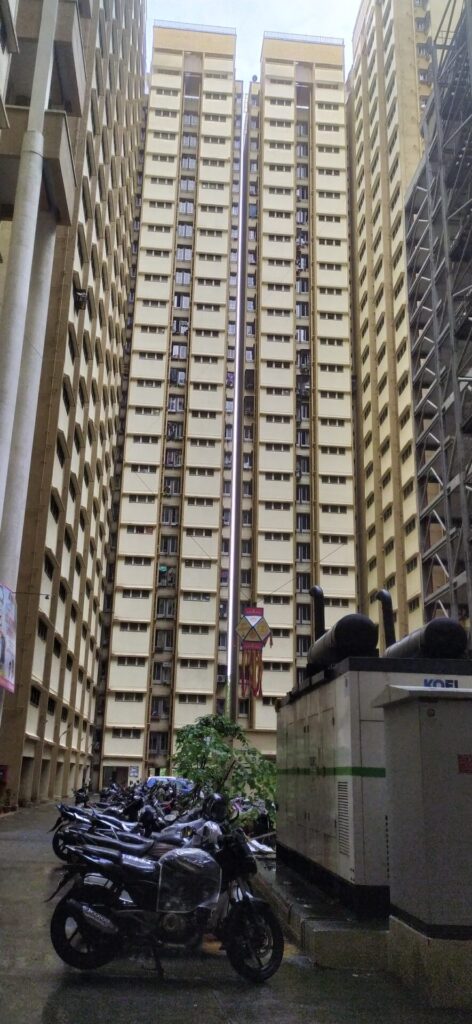More than 2400 families from tenements of BDD chawls, have shifted to transit camps over the past year. This is less than half of the number of 5104 tenements meant to be relocated in the Phase-I of the relocation process.
While many families from over 16,000 houses will be relocated as part of the BDD redevelopment project, some might opt for rental accommodation on their, and some will shift to their own redeveloped houses as they get ready.
If the scale of the project is not overwhelming enough, the initial experiences of residents at transit camps have added to the worries and anticipation of the people, who have lived in the historic tenements for generations.
The BDD chawls residents were asked to shift into brand new transit camps at Worli and Bhoiwada, with promises of 24 hours water supply in the one-room-kitchen flats, which were expected to be better and bigger than their tenements.
However, the reality of living at these swanky transit accommodation, built by the Maharashtra Housing and Area Developing Authority (MHADA) isn’t as rosy as the promises were.
More residents = less water
After the first few months of round-the-clock water supply, the supply kept reducing as more flats started getting occupied.
Jitendra Kumar Parcha, lives on the sixth floor in the 24-floor building of Bhoiwada’s Bombay Dyeing transit camp. He says, “I end up buying at least 20 litres of mineral water daily, as the water supply here has been consistently low.”
He says umpteen complaints to the MHADA, the nodal agency for the BDD redevelopment project, have failed to resolve the issue.
When he moved in December 2021, they had 24 hours of water supply and everything seemed fine. But over a period, as more people started moving in, the supply reduced drastically to just an hour. He says even in that one hour of supply, the water pressure is so low that they are unable to fill and store for family’s daily needs.
Women residents of the transit camp, have to bear the burden of this water shortage, as they shoulder most of the domestic responsibilities. “The water supply was particularly bad in May, when the city faced water shortage. We had to literally go around looking to fetch water from neighbouring houses that had little better water pressure,” says Ashwini Kule, a 12th floor resident.
Read more: BDD chawl redevelopment: Bumpy road to a better life
At times, water tankers are provided by MHADA and the Brihanmumbai Municipal Corporation (BMC).
Eventually, people found a way around by hiring a pump operator to ensure better water supply. They contributed from their pockets to get his services. “But our rooms aren’t high enough to accommodate bigger water storage tanks. So, we can’t really store much water,” says Ashwini.
The residents allege that their complaints get tossed between MHADA, which is the nodal agency for the BDD chawl redevelopment and the BMC, which handles the water supply for Mumbai.
Brand new but shoddy quality

The brand new MHADA houses of around 225 sq ft at Bhoiwada that look great from outside, came with many quality issues. The wall plaster has been peeling off at many places due to water leakages.
The lifts services are unreliable and are known to halt mid-way. Technicians are summoned regularly to get them working again.
“My 9-year-old daughter got stuck in the lift for 10 minutes. Next day, she got fever because of the fright of being stuck,” says Megha Parab.
Same problems at other transit camps
It’s the same pattern of reduction in water supply at the Century Mills or Shrinivas Mills MHADA transit camps at Worli.
“We were promised 24 hours water supply before shifting here and now we are dependent on water tankers,” says Rajesh Gupta, a shopkeeper, who was shifted to the transit camps at Shrinivas Mills compound. “Very often, the lifts do not work and it’s not unusual to see long queues of over 20 people waiting for lifts.”
Challenges before MHADA
When contacted, the chief officer of MHADA’s Mumbai board Milind Borikar said that they are pursuing the matter regarding Worli transit camp with the BMC to increase water supply.
He also said that few residents at the Bombay Dyeing transit camp, were operating the water valves themselves without co-operating with the water pump operator. Though the water supply is adequate here, as per the per capita design (consumption), the F south ward office has been asked to enlarge the water supply pipes or increase the water supply hours, he informs.
Nandlal Sabhagani, deputy hydraulic engineer (city) explained that as per the broad policy, the quantity of drinking water to be supplied to a society is calculated and adjusted against proposed water recycled from the building society’s sewage treatment plant. The residents’ society will have to complete all the formalities to operationalise its water recycling plant to meet the non-potable needs of the society, he explained.

Transit camp experience worries BDD residents
As more and more residents get shifted into transit camps, there is unease, anxiety with the way things are unfolding. Though there is an alternative to take the monthly rentals of Rs 25,000, and move on their own, very few have opted for it. Compared to the 2466 tenements, who shifted into transit camps, only 176 families have opted for monthly rentals.
“The Rs 25,000 paid by the state is inadequate to get a rented house at Worli. So, we are demanding rentals be increased to Rs 35,000 per month, otherwise we will be forced out of this area,” says Shashikant Tendulkar, a retired postman, who will be shifting from Worli BDD soon.
President of the Akhil BDD Chawl Sarvsanghtanacha Ekatrit Sangh an umbrella body of various BDD residents association, Raju Waghmare says that basic water supply issues have been streamlined after they held joint meetings between the MHADA and BMC officials.
“Now we are working to get street lights here as the place gets dark. We are also working to get bus and taxi connectivity here as this area is at the fag end and it becomes difficult to find public transport here.”
‘Our BDD chawls were better’
The residents say that the standard of living was way better at their 160 sq ft single room houses at the BDD chawls than at the 225 sq ft flats of MHADA.
“Our houses were centrally located with easy access to markets, schools, bus stops and moreover, it was safe and secure. Here everything is distant, deserted and inaccessible. The nearest bus stop or taxi stand is a good 19 minute walk away. It is more difficult in the early hours of the day or late nights, when I have to report for work. This was never an issue at our BDD chawl,” says Sanjay Chinchwalkar, who works in the emergency services at KEM Hospital.
It’s hard for residents to leave their homes, in which their families have lived for generations. The niggling problems at the transit camps, are making it harder for them to make the transition.